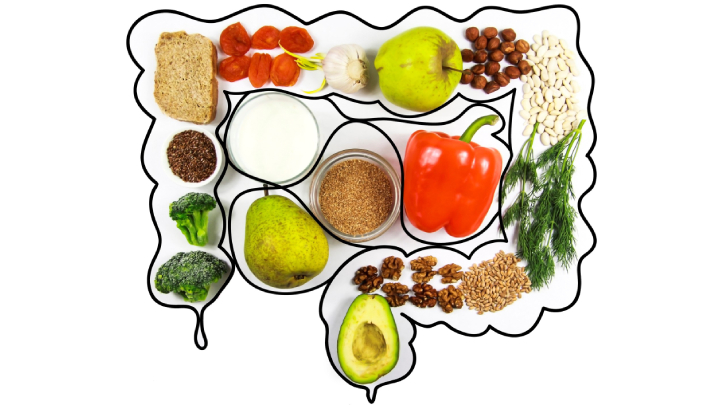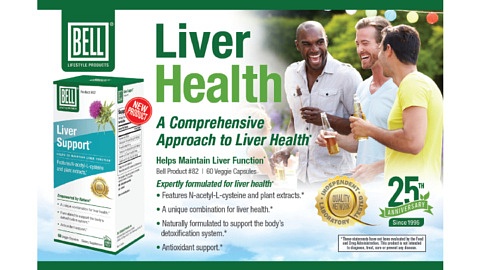The liver is an organ located within the abdomen, weighing approximately 3 lbs. This vital organ is part of the digestive system. Although there are many...
Keeping a Healthy Colon
The human digestive system, also known as the gastrointestinal tract or “GI tract” for short, is made up of a very long hollow tube and includes unique organs such as the liver, gallbladder and pancreas. Each section of this system, from the saliva in the mouth all the way down to the anus play a critical role in human health.
One of the main parts of this tract is the large intestine, commonly known as the colon. This part of the gut is responsible for processing food waste and preparing it for elimination. In other words, it’s the part of the digestive system that manufactures those brown nuggets we call poop. Our stool (the medical term for poop or feces), contains the food bits that the body doesn’t really need. It also contains metabolized waste material from hormones, bacteria, chemical messengers, fats, vitamins and minerals that the body processed throughout the day. This process of waste removal is super critical to our overall health because it guarantees that the body isn’t literally dragging around waste. But what if you don’t eliminate regularly? Well, perhaps the better question is what do we mean by “regularly? In most cases having between one to three bowel movements a day is considered healthy, while optimal is considered three times a day, ideally following each meal.
So, if you’re not eliminating at least once a day the result is reabsorption of this unwanted waste material, bringing it back into the system. This can wreak havoc on the skin, energy, mood and even contribute to weight gain. Long term constipation can lead to inflammation, infection and potentially negatively impact colon cells. People that don’t experience the daily urge often complain of bloating, belching, foul smelling flatulence, bad breath, heart burn/reflux and lots of abdominal discomfort. All of this is not surprising considering they have waste material rotting away in the gut. Constipation certainly isn’t a pleasant experience, after all, the digestive system is a one-way tube and back-ups are not normal. Below are some tips on how to keep the colon functioning smoothly.
Ways to keep the colon healthy:
Eating a diet high in fibre and vegetables, staying hydrated by consuming lots of water, and exercising regularly are important lifestyle modifications that have shown to improve daily bowel movements and overall colon health. However, in some instances these modifications may not be enough and additional support might be needed.
Various herbs such as rhubarb, aloe and senna can help stimulate bowel movements by either drawing water into the lumen of the colon, bulking up the stool or irritating the gut lining to facilitate stool movement. Whichever method is used, laxative herbs have always been a fairly reliable method to help with “the go” and cleanse the body.
Additionally, supplementing with antioxidants and anti-inflammatory agents such as green tea[i], turmeric[ii] and resveratrol can potentially reduce damage to the cells that line the colon. In particular one study out of Japan reported individuals with high green tea consumption demonstrated a trend towards reduced colon cancer risk[iii]. So incorporating these powerful herbs into your daily regimen can benefit an inflamed and irritated colon.
Making small changes to your daily diet and supplementing with powerful herbs can help cleanse and reduce that extra baggage in your gut.
[i] Forester S., Lambert J. (June 2011). Antioxidant effects of green tea. Molecular nutrition food research; 55(6): 844-854.
[ii] Ghosh S.S., He H., Wang J., Gehr T.W., Ghosh S. (2018). Curcumin-mediated regulation of intestinal barrier function: The mechanism underlying its beneficial effects. Tissue barriers;6(1): e1425085.
[iii] Wada K., Oba S., Tsuji M., Goto Y., Mizuta F.,, Koda S., Uji T., Hori A., Tanabashi S., Matasushita S., Tokimitsu N., Nagata C. (June 2019). Green tea intake and colorectal cancer risk in Japan: the Takayama study. Japanese journal of clinical oncology;49(6): 515-520.
Related Posts
December 15, 2022 – South Haven Michigan – Liver Support
Bell Lifestyle Products announced today their new Liver Support product for the U.S....
Men’s Digestive Health
Bell LifestyleMarch 31
Whether it’s flat or flabby, gut health is
an important factor in overall health. Medically speaking the gastrointestinal
tract (GI tract) is a complex...
December 15, 2022 – South Haven Michigan – Liver Support Bell Lifestyle Products announced today their new Liver Support product for the U.S....
Men’s Digestive Health
Bell LifestyleMarch 31
Whether it’s flat or flabby, gut health is an important factor in overall health. Medically speaking the gastrointestinal tract (GI tract) is a complex...
Categories
- Allergy Relief
- Bell Lifestyle News
- Brain and Vision Health
- Depression
- Digestive Health
- Eating Healthy
- Energy Boosts
- Fitness
- Foods for Energy
- Heart and Lung Health
- Herbs
- Immune System Support
- Lifestyle
- Men's Health
- Mental
- Motivation
- Natural Remedies
- Nutrition
- Pain Relief
- Physical
- Recipes
- Relationships
- Sexual Health
- Skin and Hair Health
- Sleep Health
- Social
- Stress Relief
- Uncategorised
- Videos
- Weight Management
- Women's Health
- Your Wellness Now
Follow us on Twitter
#90 Bladder One for Women™ is a convenient one-a-day capsule for urinary tract health, featuring herbal extracts in… twitter.com/i/web/status/1…
May 2023Urinary tract infections - UTI: To treat or prevent? That is the question. Find out more about causes and treatme… twitter.com/i/web/status/1…
May 2023"How you feel is very important to how you look. Healthy equals beautiful." - Victoria Principal #womenshealth https://t.co/OPShoEbOXb
May 2023
© Copyright 2025. All rights reserved.





